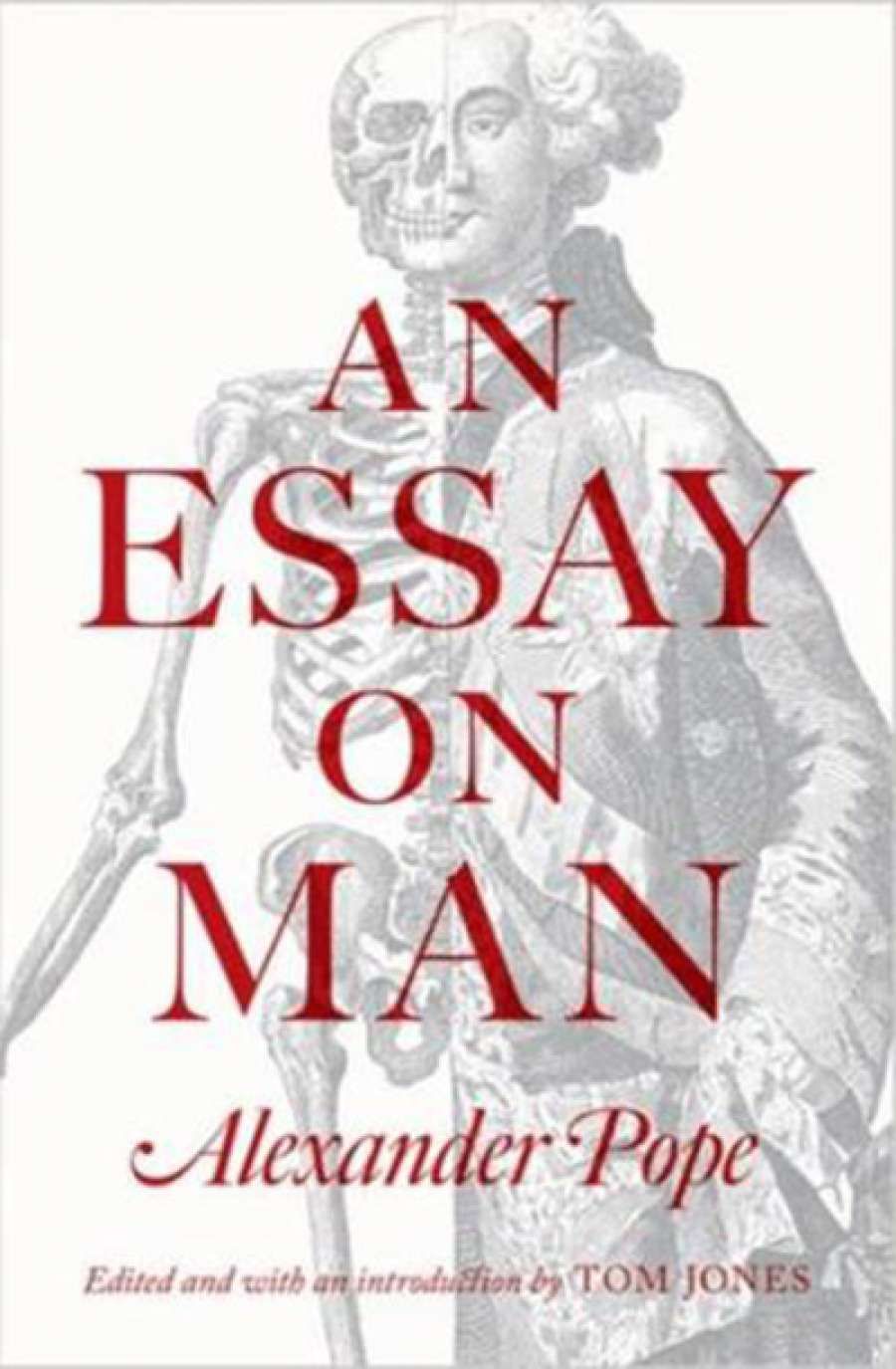
- Free Article: No
- Contents Category: Poetry
- Custom Article Title: Robert Phiddian reviews 'An Essay on Man' by Alexander Pope, edited by Tom Jones
- Book 1 Title: An Essay on Man
- Book 1 Biblio: Princeton University Press (Footprint) $49.95 hb, 248 pp, 9780691159812
Coming back to An Essay on Man for the first time in a while, I am struck by how Pope’s rage for precision constantly isolates the paradoxes of life that energised the Age of Reason and remain urgent now. Are we driven by passion or reason? How should we balance their competing claims, at a personal, social, or even ecological level? Easy in this strange year of Trump, Brexit, and angry electorates to give in to Yeats’s apocalyptic gloom: ‘The best lack all conviction, while the worst / Are full of passionate intensity.’
It is more constructive, I think, to read the Essay and pause over lines like ‘On life’s vast ocean diversely we sail, / Reason the card, but Passion is the gale’. Jones’s note explains that a card was a navigational aid for mariners, so the general proposition that passion is a dangerous but necessary force in tension with reason is clear. Things are always this lucid in Pope, but they are seldom merely lucid. Consider ‘diversely’, suspend your sense of how we pronounce it these days (noting that it makes the line lumpy on the tongue), and realise that it would have been (and must, metrically, be) pronounced ‘divers–ly’. You either have a pointlessly irregular pentameter or, far more probably, a punning suggestion of divers penetrating an ocean of complexity that reason seeks only to guide us over. Emotion and order are joined, but forever pull in different directions. It is not a matter of one ruling the other, and balance is a tepid word for the fraught relationship, though having the balance ‘out’ is a dangerous thing, today as in 1734.
Where do humans fit in the ecological order? There are few more urgent social and political questions today, and Pope provides not a complacent answer, but a brilliant setting of the problem:
Ask you for what end the heav’nly bodies shine,
Earth for whose use? Pride answers ‘’Tis for mine:
‘For me kind Nature wakes her genial pow’r,
‘Suckles each herd, and spreads out ev’ry flow’r;
...
‘Seas roll to waft me, suns to light me rise;
‘My foot-stool earth, my canopy the skies.’
Do we call our dominating and destructive attitude to the environment pride these days? Why should we not? Our aspirations lead us equally to creativity and destruction, and we only have the one planet on which to play out our fate.
Unlike other animals, we are capable of reasoning and detachment, but we are driven by passions that have much wider scope. In the age of the anthropocene, Pope’s great peroration at the start of Epistle II on the middle state of humans is both true and challenging:
Chaos of Thought and Passion, all confus’d;
Still by himself abus’d or disabus’d;
Created half to rise, and half to fall;
Great lord of all things, yet a prey to all;
Sole judge of Truth, in endless Error hurl’d:
The glory, jest, and riddle of the world!
 Portrait of Alexander Pope (Sir Godfrey Kneller [1646–1723], Wikimedia Commons)It is not as if we can choose to rise and have done with it. It is a constitut- ive paradox of being human, both as individuals and as groups. We imagine supercilious men in wigs, but that is far from the truth. Pope’s was an age of restless searching after truth and reason, not of placid truisms.
Portrait of Alexander Pope (Sir Godfrey Kneller [1646–1723], Wikimedia Commons)It is not as if we can choose to rise and have done with it. It is a constitut- ive paradox of being human, both as individuals and as groups. We imagine supercilious men in wigs, but that is far from the truth. Pope’s was an age of restless searching after truth and reason, not of placid truisms.
Jones’s edition makes the energetically paradoxical Essay on Man accessible, in a size that sits nicely in the hands and doesn’t burden your conscience with all the unread texts in an anthology or collected works. The introduction is extensive and excellent, though the notes sometimes seem waylaid by narrow scholarly concerns. I can think of only two greater poems in English about life, the universe, and everything – Paradise Lost and The Waste Land. And the Essay is perhaps more persistently useful to think with than even those two. If we can get over our clichéd misapprehension that it is an orthodox hymn to rational order, Pope’s philosophical poem is as volatile and challenging as ever.


Comments powered by CComment